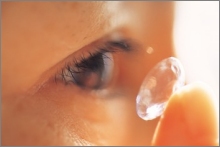Contact Lenses:
The Risks that Every Contact Lens Wearer Needs to Know
by www.SixWise.com
About 135 million people around the world, including more than 24 million in the United States, wear contact lenses instead of glasses to correct their vision problems. The benefit that these tiny plastic discs have over glasses is, of course, their invisibility and convenience.
|

All contact lenses reduce the amount of oxygen that reaches your cornea, which increases your risk of eye infections.
|
With contacts, you don't have to worry about smudging or fogging up your glasses, misplacing them or losing them altogether. And from an aesthetic perspective, many prefer the fact that contacts are nearly invisible. But they do come with a downside.
All contact lenses reduce the amount of oxygen that reaches your cornea, and this can promote infection. Wearing contact lenses also puts you at risk of developing corneal ulcers. According to the U.S. Food and Drug Administration (FDA), "These conditions can develop very quickly and can be very serious. In rare cases, these conditions can cause blindness."
Other risks that wearing contact lenses pose include:
-
Dry eyes
-
Swelling or other problems with the cornea, such as hazy vision, corneal scratches and scrapes, or changes in shape
-
Allergic reactions to contact lens solution
-
Deposits on the lenses, which may make them less comfortable and increase the risk of infection
-
Eye and eyelid inflammation
Minimizing Your Risks: Important Do's and Don'ts for Contact Lens Wearers
The way you care for your lenses plays a major role in your risk of infection or other problems. If you or someone you love wears contacts, be sure to print out the following tips for easy reference.
What You SHOULD DO ...
-
Always wash and dry your hands thoroughly before handling your contacts.
-
Be careful with multipurpose cleaning-disinfectant-storage solutions. Two brands have been recalled after being linked to serious eye infections. If the solution looks discolored, do not use it, and always rub the solution gently on the lenses to enhance the cleaning effectiveness.
-
Replace your contact lenses as recommended.
-
Choose daily wear contacts. They are linked to fewer infections than extended wear contacts.
-
Always take your contacts out at night. Wearing contacts overnight increases your risk of infection (even among those made to be worn overnight).
-
After inserting your contacts, rinse the case with warm water and allow it to dry.
-
Replace your contact lens case every here to six months, and discard the solution in the lens case each time you clean the lenses.
-
Follow the care instructions provided by your eye care professional, and use only sterile products made specifically for contact lens care.
|

You should always remove your contacts at night, as wearing them while you sleep increases your risk of infection (even if the lenses are meant to be worn overnight).
|
What You SHOULD NOT DO ...
-
Do not wash your contacts with water, saliva or a homemade solution, as this may not disinfect them properly.
-
Do not wear colored or decorative contacts for fashion purposes.
-
Do not top of the old solution in your contact lens case. Discard and start fresh each time.
-
Do not mix contact lens solutions together.
-
Do not share your contact lenses with someone else.
-
Do not take your lenses in and out throughout the day.
-
Do not purchase bootleg lenses.
-
Do not sterilize disposable lenses, throw them away as directed.
Danger Signs Every Contact Lens Wearer Should be Aware Of
Because eye infections can become serious very quickly, it's important to know the warning signs of infection. If you notice any of the following symptoms, you should call your doctor immediately:
-
Blurry vision
-
A scratchy feeling in your eye
-
Pain or discomfort in your eye
-
Redness in your eye for more than two days
-
Discharge or excess tearing from your eye
-
Itching, burning or gritty feelings
-
Swelling
Recommended Reading
LASIK Surgery: What are the Risks vs. the Benefits?
How to Treat Pink Eye
Sources
U.S. FDA: Contact Lenses
The University of Michigan Kellogg Eye Center
WebMD.com Eye Health Center
MayoClinic.com Contact Lenses